Best MTB grips – our testers' picks of the models that will improve your mountain bike's comfort and handling
Choosing the best MTB grips will give you maximum comfort and control of your bike wherever you ride
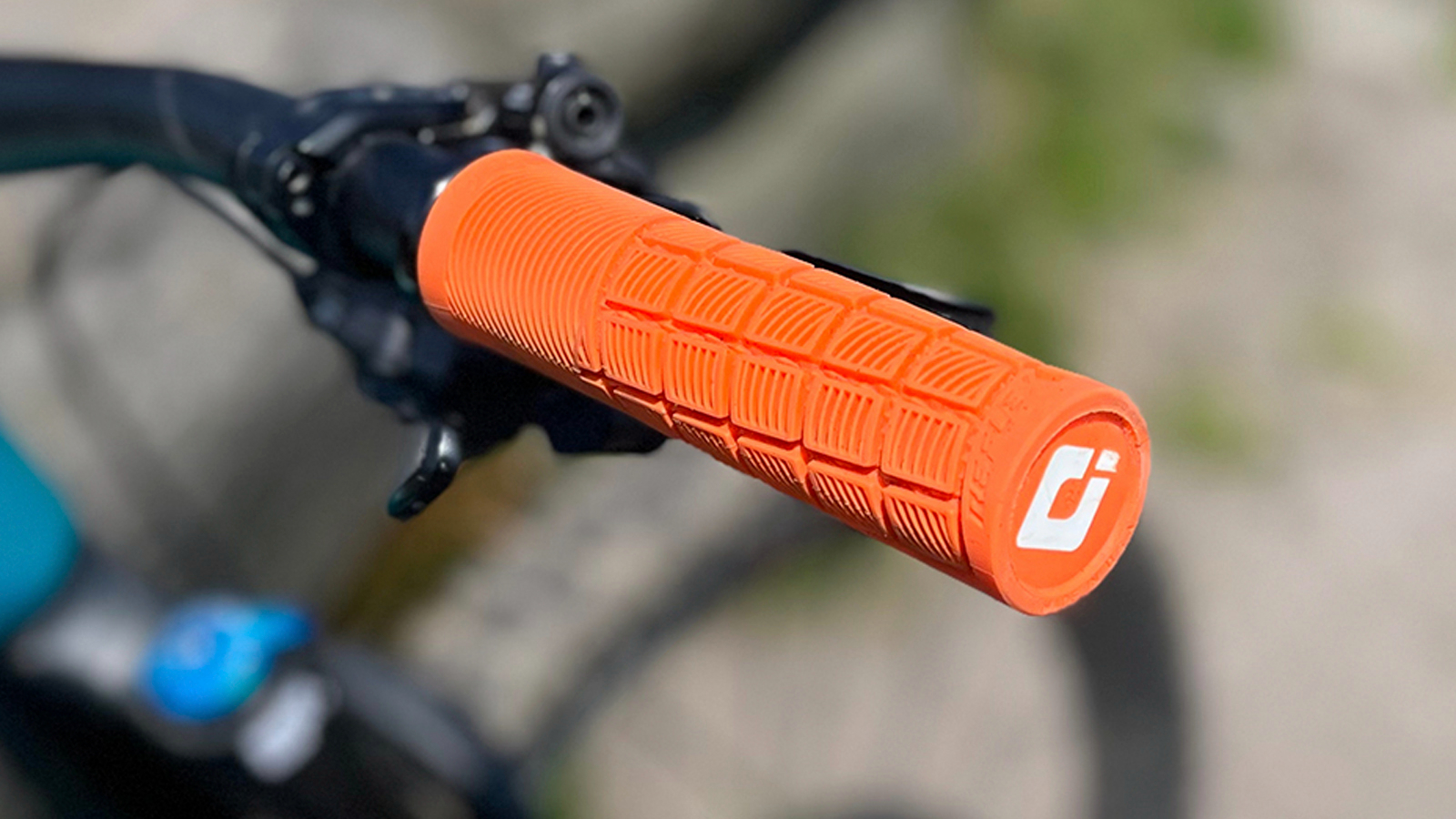
The best MTB grips are crucial to getting the most out of mountain bike riding. As one of the three key contact points a rider has with their mountain bike, MTB grips may seem like a small thing but they're actually incredibly important.
Investing in the best MTB grips will not only improve riding performance and help you to hang on to your handlebars on white-knuckle descents, but they will also deliver superior hand-grip and comfort making them less fatiguing over longer rides.
Just like the best mountain bike saddles and best mountain bike shoes, everybody has their preference when it comes to the best MTB grips, and what suits someone who has small hands isn't going to be comfortable if you have big hands.
Our experts have tested how a range of the best MTB grips handle in both wet and dry conditions, assessing their texture, grip, size, price, and durability. Scroll down for our complete round-up.
There is a lot of choice when it comes to grips, so if you're not sure what you're looking for, skip to the bottom of the page where we explain how to choose the best MTB grips for you.
Best MTB grips
Why trust BikePerfect
The quick list
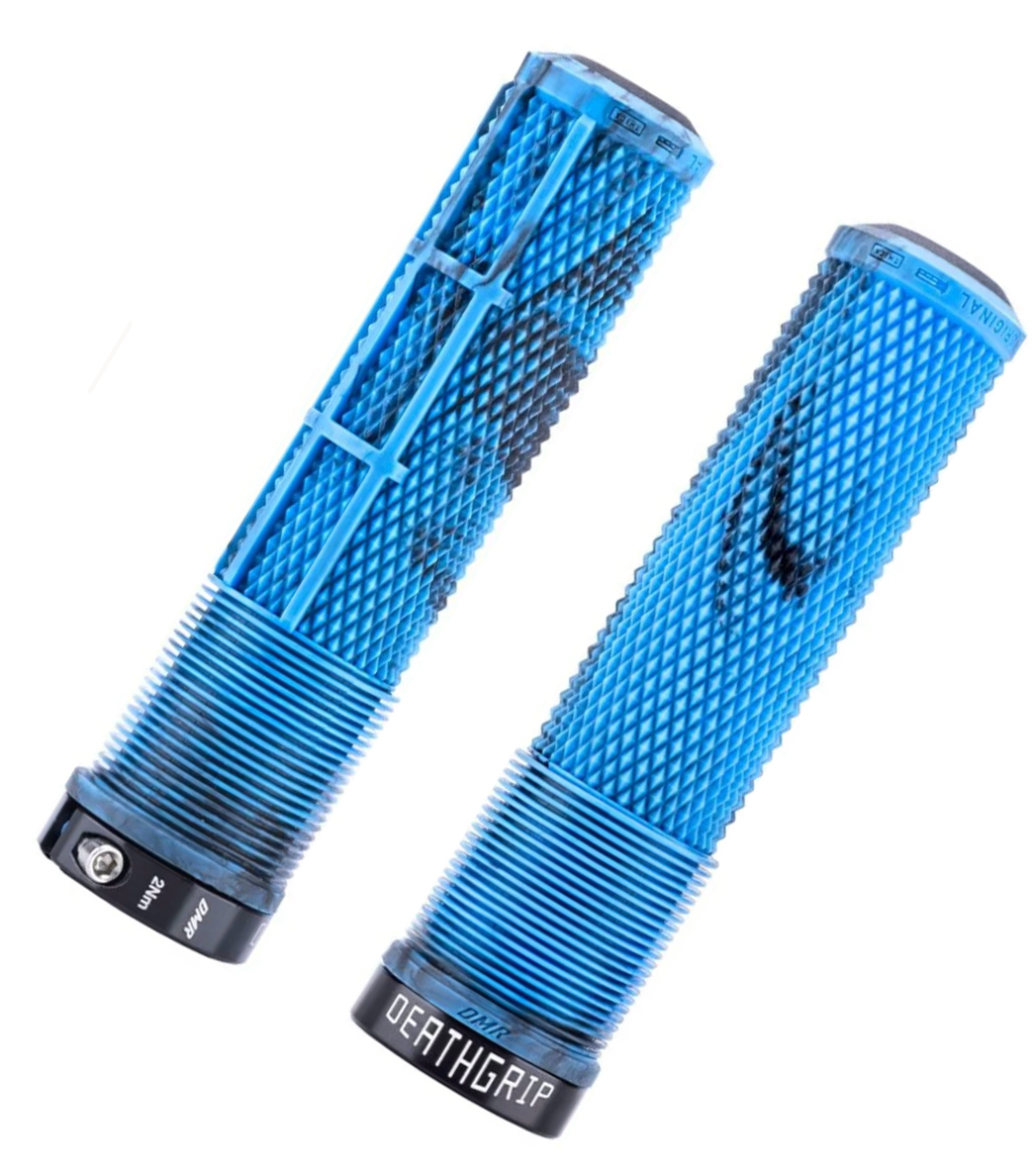
Best MTB grip overall
Improves on the original Deathgrip with better bar security and more durable ends.
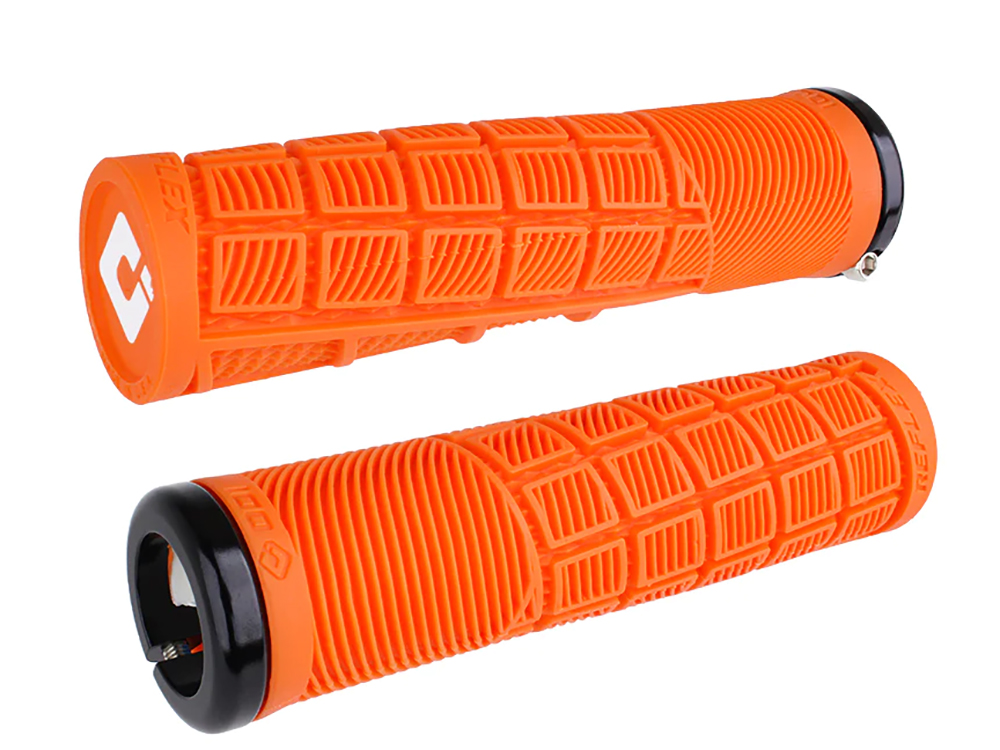
Best MTB grip runner-up
The multi-faceted design leads to a great all-round performance that blends grip, shock absorption, and comfort.
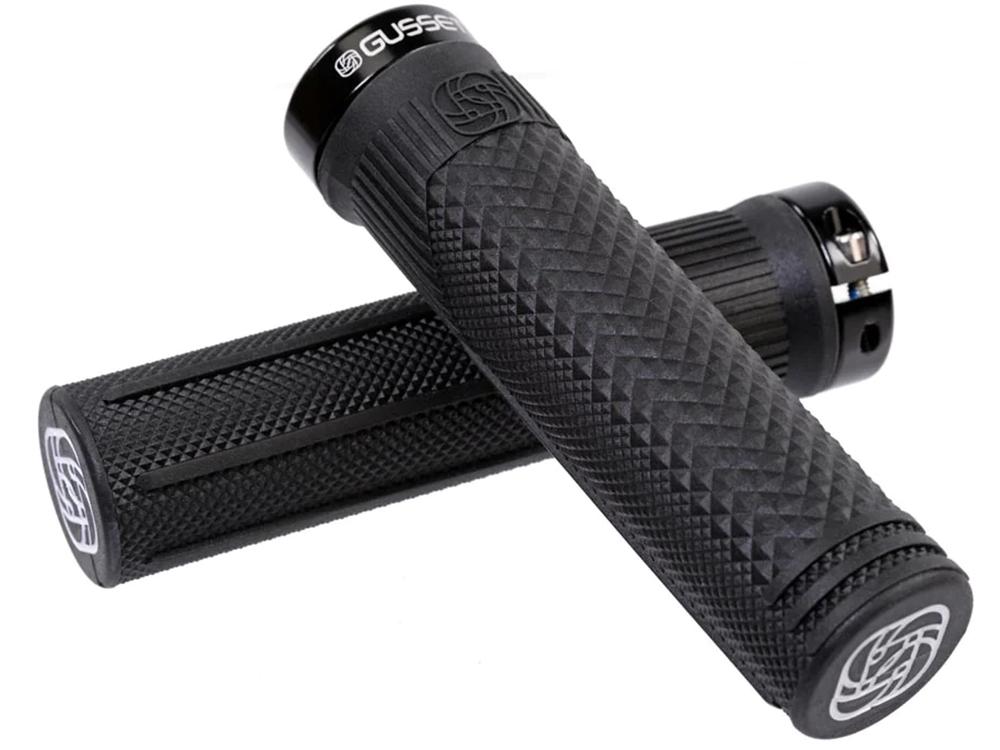
Best super-sticky MTB grip
Excellent grip with a very tacky compound and zoned control features, and at a good price.
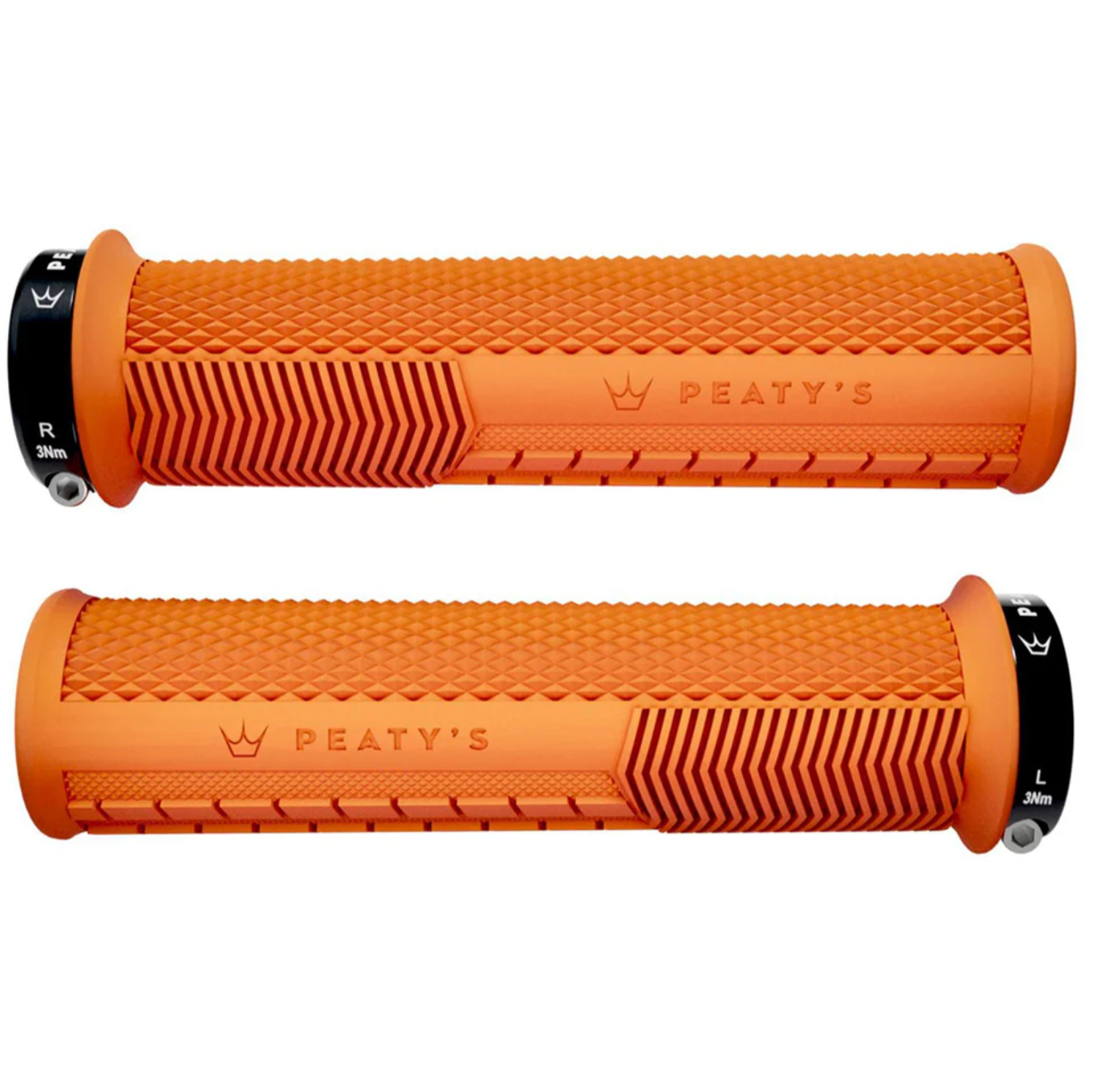
Best eco-friendly MTB grip
High-control grip made using recycled ocean plastics, there's no plastic used in the packaging either.
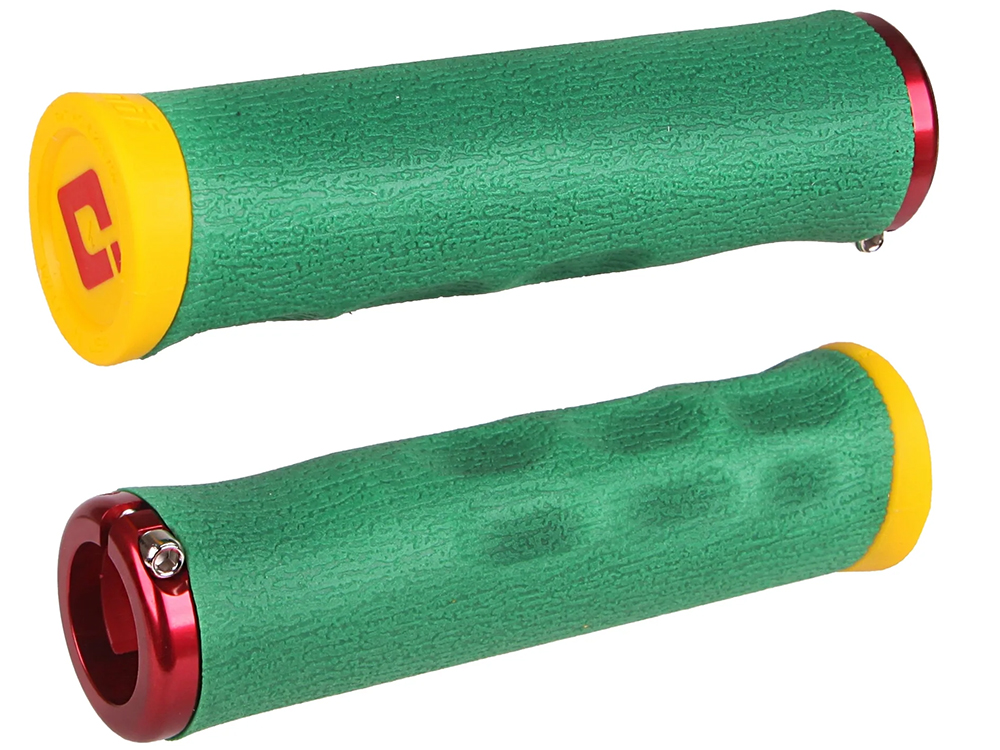
Best MTB grip for comfort
A comfy high-end grip with plenty of padding that works well for long-distance trail cruising.
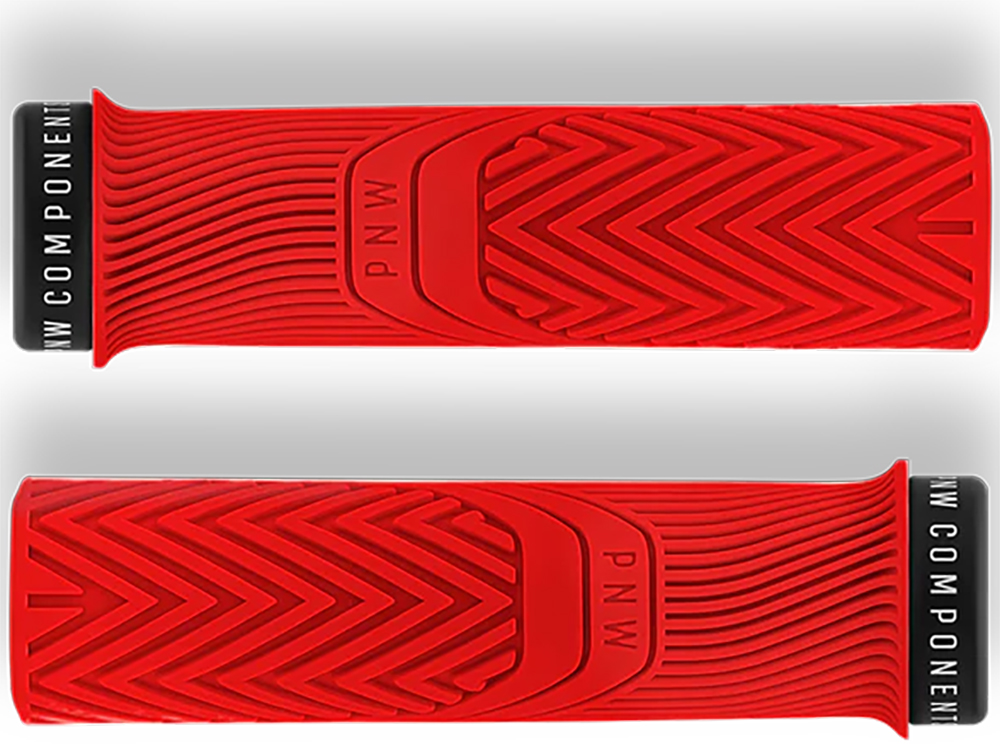
Best super-soft compound MTB grip
The ultra tacky compound gives excellent wet or dry grip, and it comes in nine different colors.
See the next 5 grips ↓
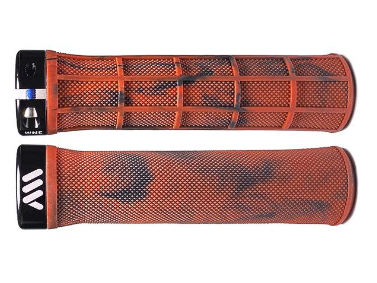
Best MTB grip for small hands
The small tapered and narrow profile will suit smaller handed riders, and there is plenty tactile trail to hand feedback
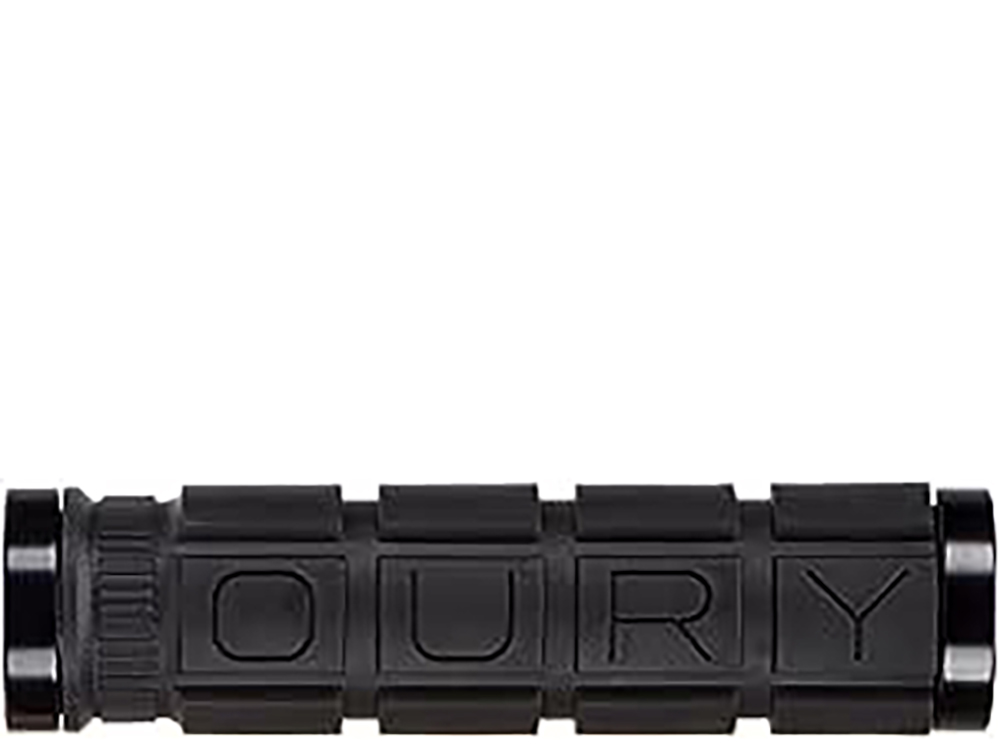
Best MTB grip for big hands
Great for bigger mitts with a thick diameter, and the grippy compound absorbs plenty of trail buzz.
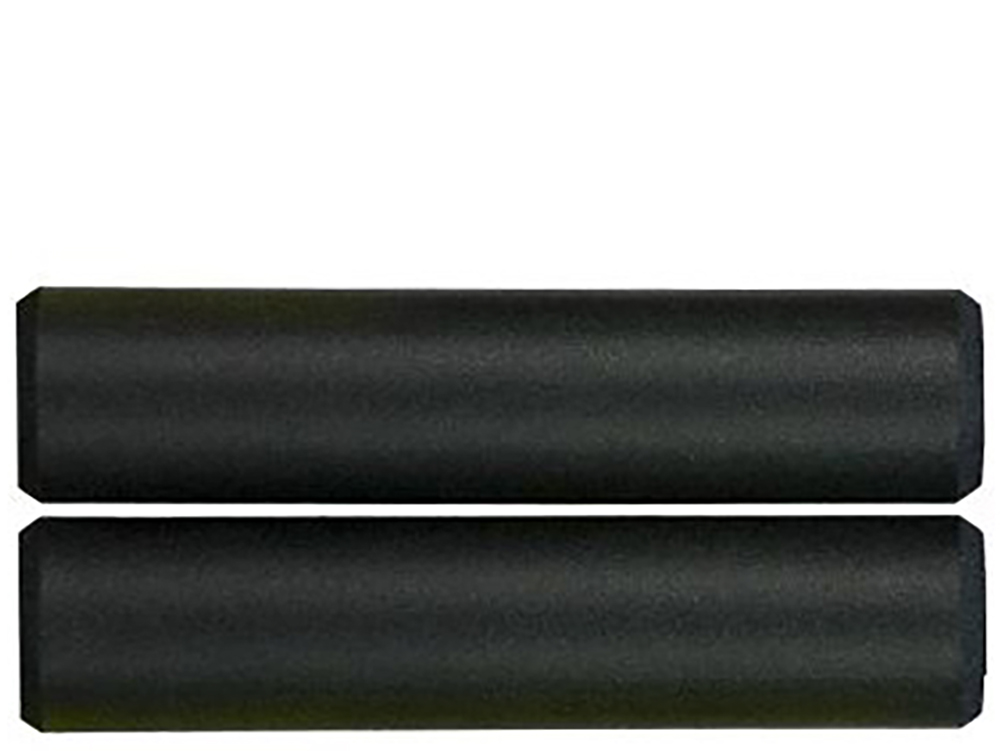
Best lightweight MTB grip
A silicone tube that's lightweight, offers plenty of vibration damping, durability, and heaps of purchase even when wet.
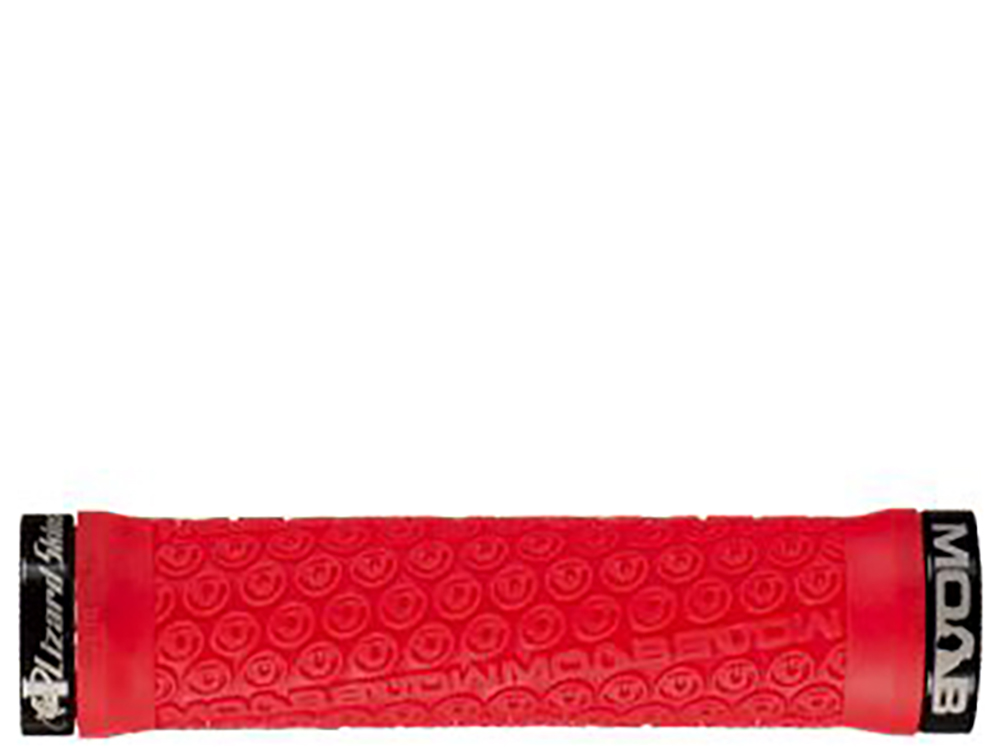
Best wet weather MTB grip
The low profile but sticky pattern offers good grip, even in the soaking rain without gloves.
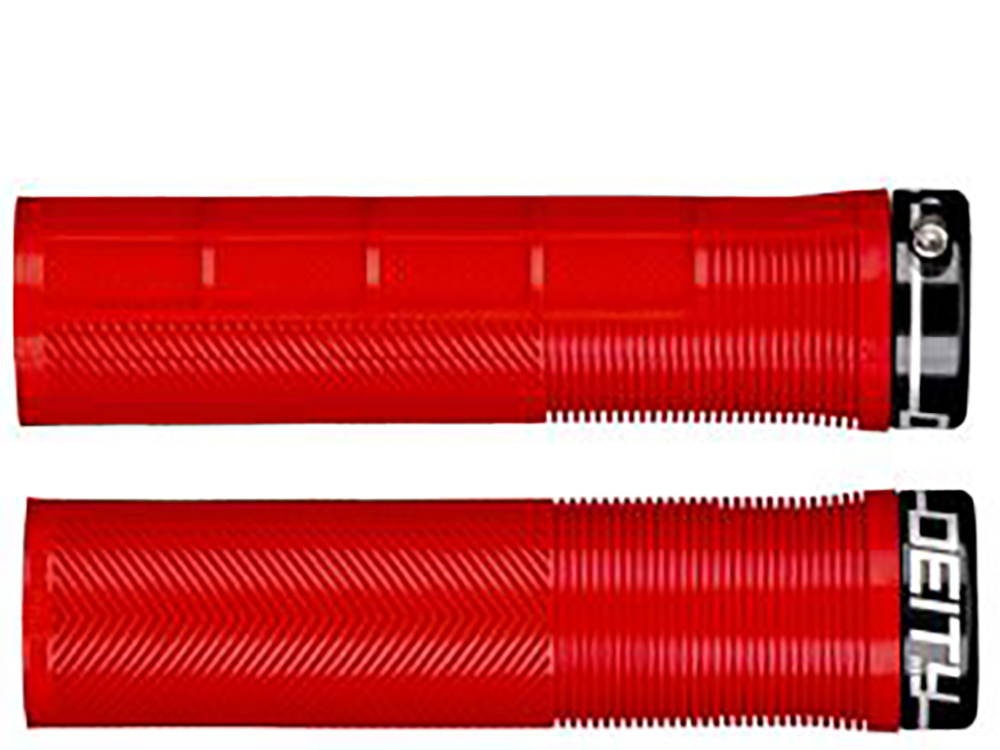
Best MTB grip for color range
With a tapered ergo design, and available in enough colors to match any bike.
1. Best overall
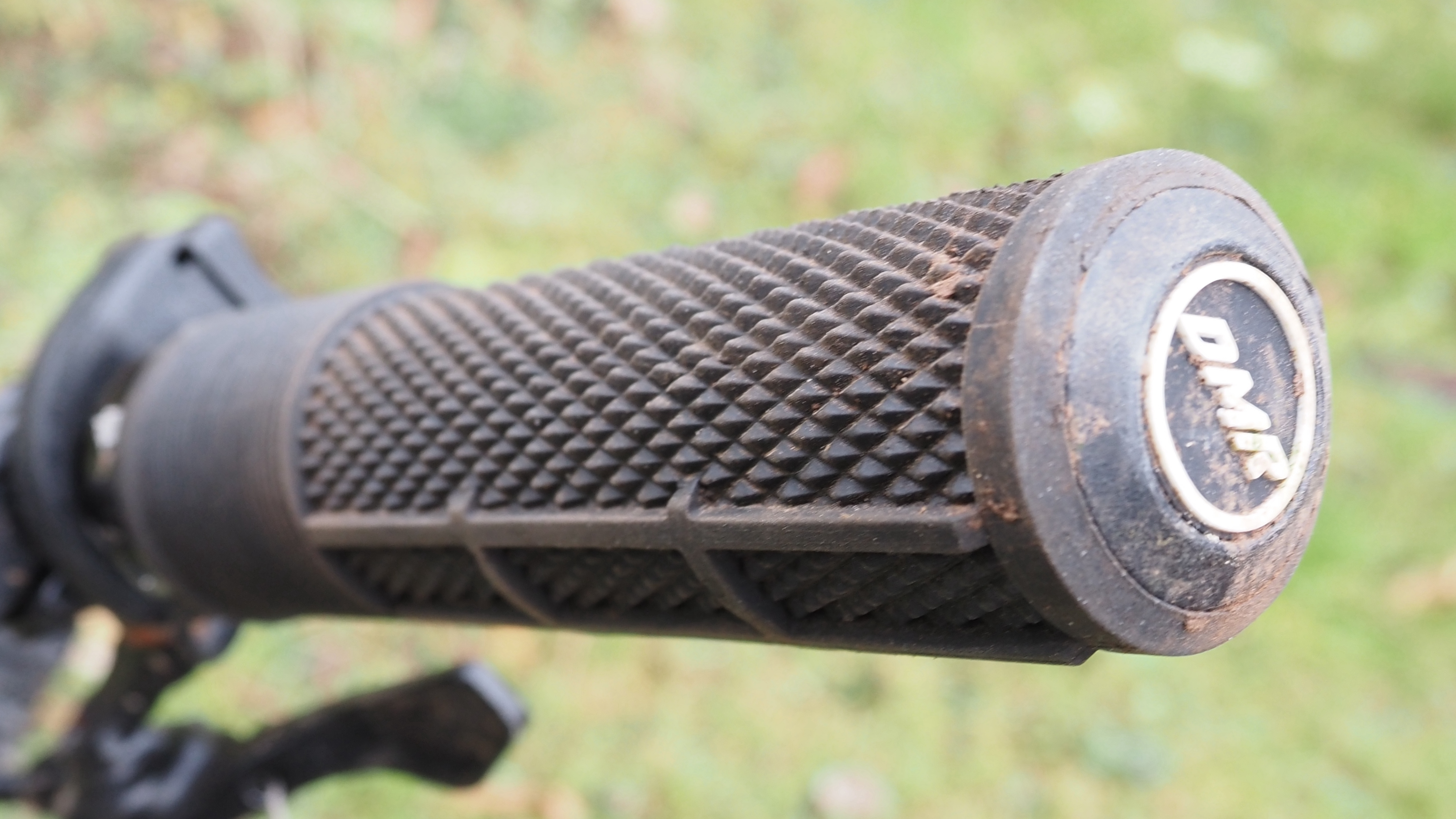
Specifications
Reasons to buy
Reasons to avoid
The original DMR Deathgrips are some of the most popular grips around – and for good reason. A three-texture grip combo blends a ribbed mushroom-style inner section and a knurled pattern with a waffle section for maximum palm and fingertip traction. The result gives really comfortable contact points with a superbly tactile level of grip.
DMR says it has tweaked the Deathgrip2 grip pattern for "millimetre-perfect positioning", but comparing the grips it's hard to see the difference. What is noticeable is that the inner core is now slightly tapered to give a more secure fit, the lock-ring is slightly narrower, and the grips get a robust, injection-molded, integrated end cap.
Like the original, the Deathgrip2 comes in three compounds – Gum (the hardest at 25A), Soft (20A) and Race (15A) – all are available flanged or flangeless. The Soft versions are what most riders use and come in a wide range of colors.
I've been running various sets of the originals for many years and have also been testing the Soft, Thick Deathgrip2s since they launched. The changes to the original may be small but they're significant all the same. The tough end caps mean the new grips are much more robust and can withstand being scuffed or dropped without serious damage. Tapering the inner core means the grips need to be tapped with a soft-faced mallet to fit, but there's zero movement on the bars once in place.
Only the most extreme-weight counters will care, but the weight of the grips has increased by a few grams – presumably due to the tapered core and sturdier end caps. I weighed a pair of flanged Soft, Thick Deathgrip2s at 114g (V1s were 108g), and the same spec flangeless versions at 106g (V1s were 98g).
2. Best runner-up
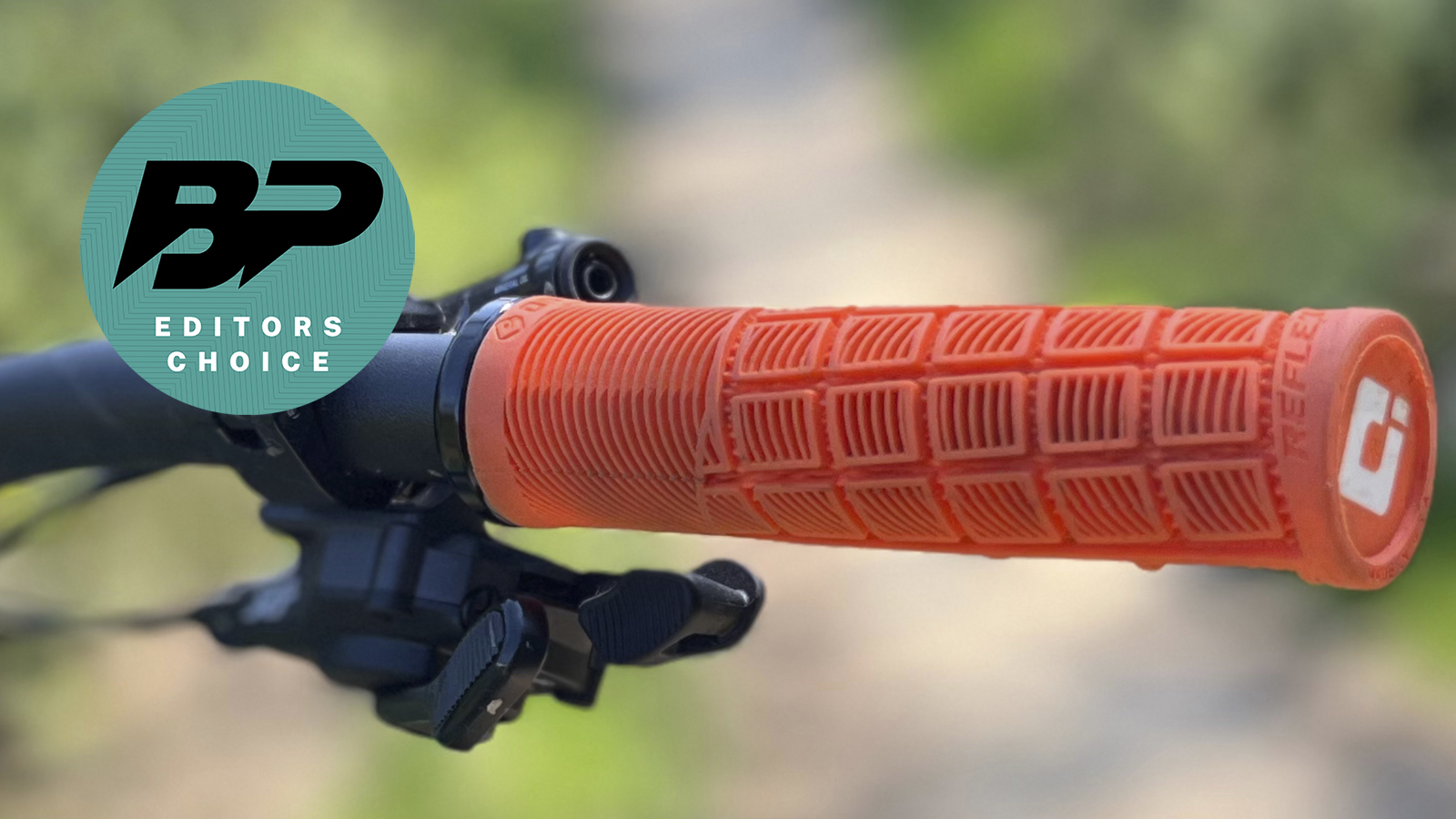
Specifications
Reasons to buy
Reasons to avoid
To be honest, performance-wise, there's very little to choose between the ODI Reflex and our top model, the Deathgrip2. However, being slightly cheaper and coming in a wider number of options, the DMR model takes the best grip crown.
Our tester, Neal Hunt, was so impressed with the Reflexes that they are now his go-to grips. Some of the features that stood out the most were the overall comfort and the brand's claims of longevity, which they more than lived up to, and that's a tricky balance to get right.
Although they come in on the more costly end of grips in this guide, they are top quality and truly offer genuine performance benefits for a fraction of the cost of upgrading elsewhere on your bike.
In Neal's testing, he was very impressed with the design of the ODI Reflex grips which go a long way to delivering the excellent comfort and performance qualities he loved. ODI has set out to achieve this with three different areas of the grip, all using its proprietary grip compound that offers impressive damping and longevity.
The main upper part of the grip uses raised cushioned ribbed lugs that sit under your hands, the lower section incorporates a knurled area designed to help improve grip, and, like the Deathgrip2, there's a mushroom section near the brake lever.
To check out Neal Hunt's full findings, read his full ODI Reflex review.
3. Best super-sticky
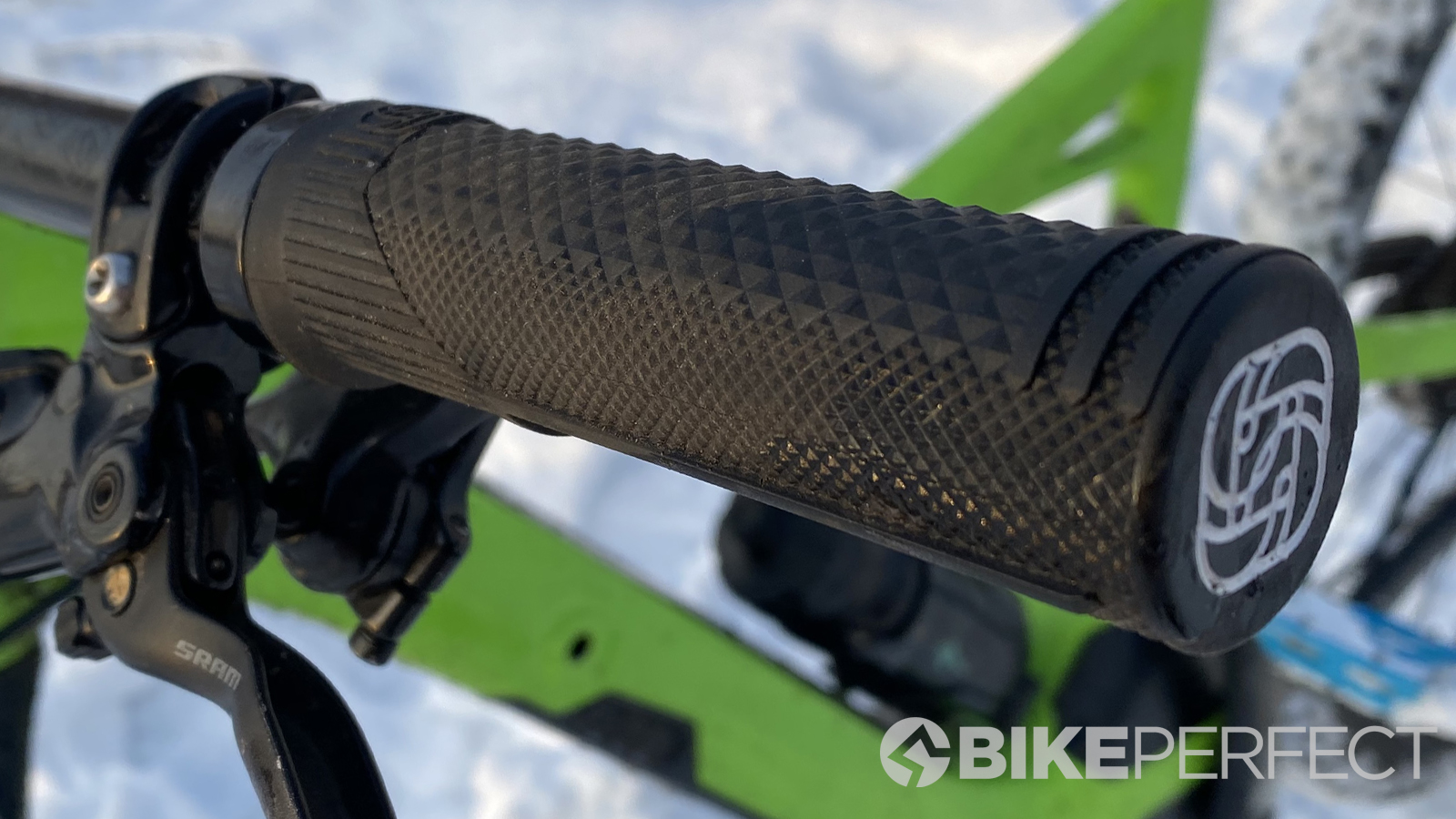
Specifications
Reasons to buy
Reasons to avoid
Another top performer that delivered the goods in the wet and cold, as well as other riding conditions in testing are the Gusset S2 Extra Soft MTB grips. As Guy Kesteven pointed out, the best MTB grips regardless of how good they claim to be on the brand's PR are a personal choice component, with most riders having their own favorites and requirements.
Guy has tested hundreds of grips and he was quick to highlight the Gusset S2 Extra Soft as a great choice for anyone looking for a soft and super sticky compound, that comes with a very budget-friendly price.
He did note that due to the softness, they would be likely to wear quicker, but as they are such a great value, it meant regular replacement wouldn't blow the budget, and also pointed out that Gusset offers a Standard S2 option with a harder wearing rubber, but with all the same features, if you prefer more longevity.
Want more detail? Check out our Gusset S2 Extra Soft Compound grip review for all the info.
4. Best eco-friendly
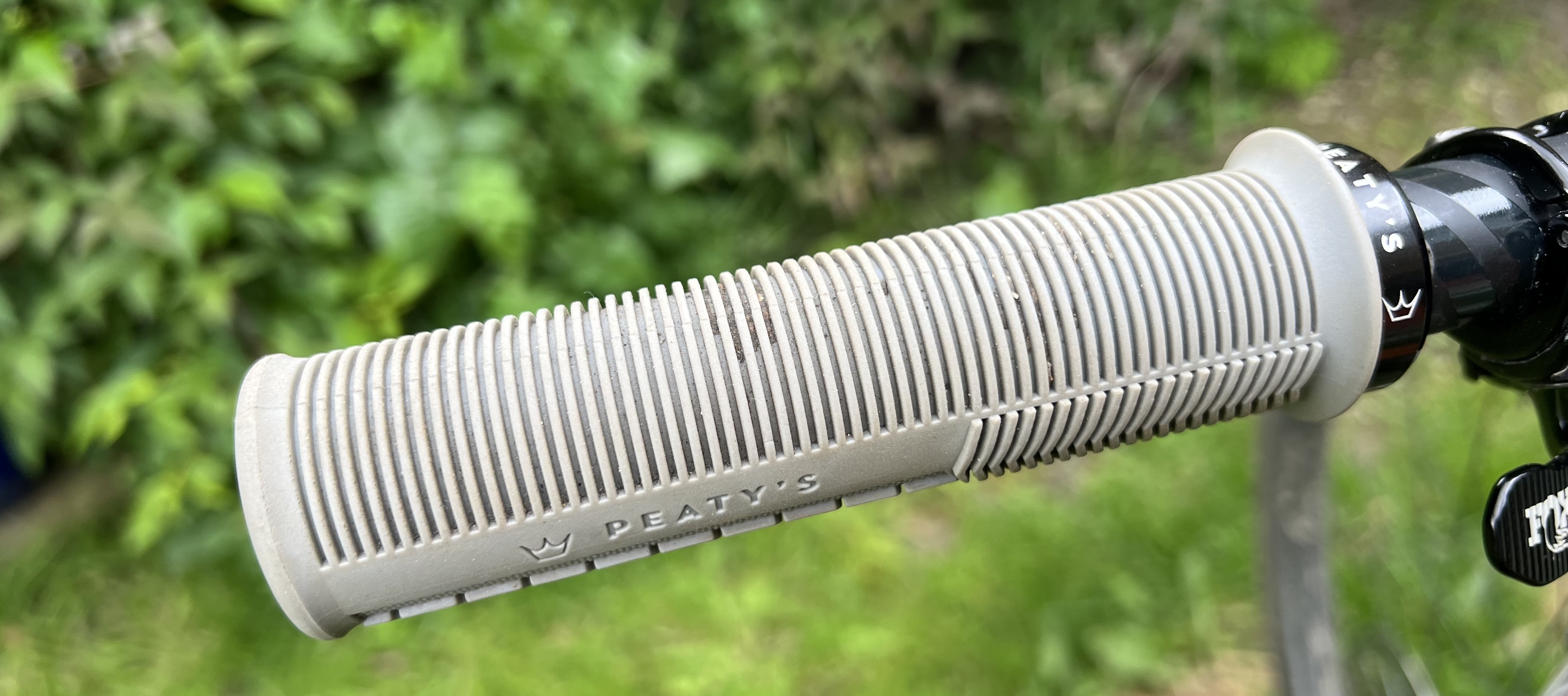
Specifications
Reasons to buy
Reasons to avoid
Peaty's Monarch grips come in two texture options – Mushroom and Knurl – but both of those designs are more sophisticated than the names suggest. Both have ribbed mushroom sections near the thumb and forefinger section for comfort, and raised strips on the underside for extra finger grip.
The grips have an offset core so there's more of the 20A rubber on the upper section and come in Thick and Thin options. But rather than being the same thickness throughout, the Monarchs are tapered, getting thicker along their length towards the end plugs. The Thin grips are 30mm at their thinnest and 32mm at the plug, while the Thick are 32 and 34mm.
Eco-credentials-wise, the cores are made using 80% recycled ocean plastic and the packaging is almost all cardboard, the only exceptions are two metal rivets.
In terms of performance, the Monarchs are up there with the best grips in this guide. Guy Kesteven tested them and was extremely impressed. "There are load of different grip options available, but for me, the Peaty’s approach of trying everything and cherry-picking the best parts of each really works.
"The tapered, asymmetric design means even the Thin knurled grips give super clean and precise feedback in all weathers without being bruising. Alternatively, the semi-ushroom design adds noticeable comfort without diluting bar control or compromising confident grip. The compound seems a great balance of tactile and tough so far, the pricing is reasonable and Peaty’s deserve credit for thinking eco where they can."
For more, see our Peaty's Monarch grip review.
5. Best for comfort
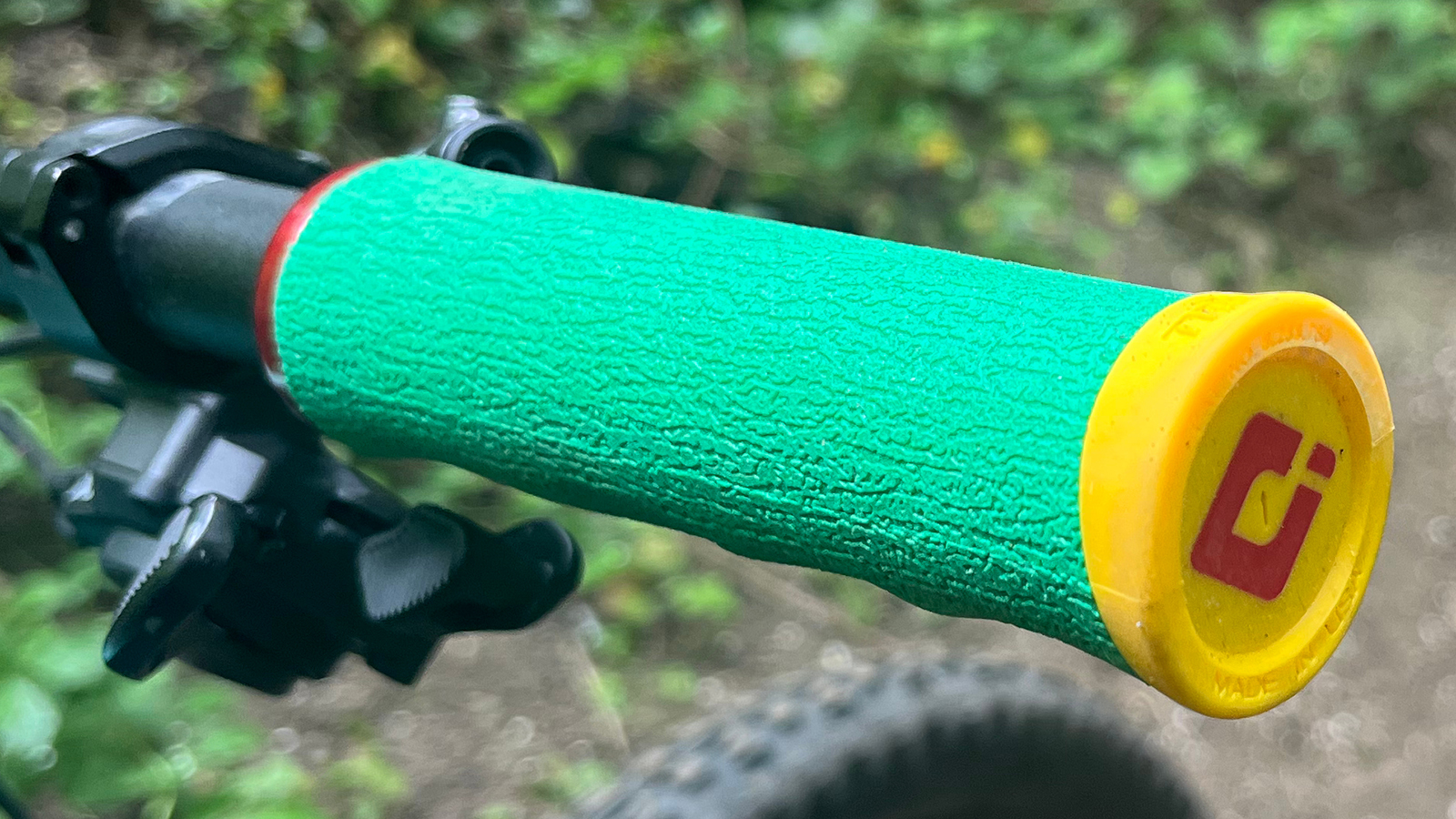
Specifications
Reasons to buy
Reasons to avoid
Receiving the best for comfort spot in a best MTB grip guide is a fairly worthy crown to hold, and the Dread Lock grip from ODI claims that title. In his tests Neal Hunt found the simple shape and soft-feeling foam compound made for a very comfortable grip that he felt would be ideal for XC and long-distance riders.
Design-wise, Neal loved the simplicity, and the Dread Lock comes with a straightforward smooth profile and a gently contoured surface, which differs greatly from its feature-laden sibling the ODI Reflex grip.
Overall, Neal was pleasantly surprised by the ODI Dread Lock grip, and compared with other foam silicone grips he's tested, the Dread Locks didn't suffer from premature wear and fragility. He did add that you lose a bit of feel, and trail feedback can be muted, but they last well and are far more comfortable and robust than a classic foam grip.
For more detail, check out Neal's ODI Dread Lock grips review.
6. Best super-soft compound
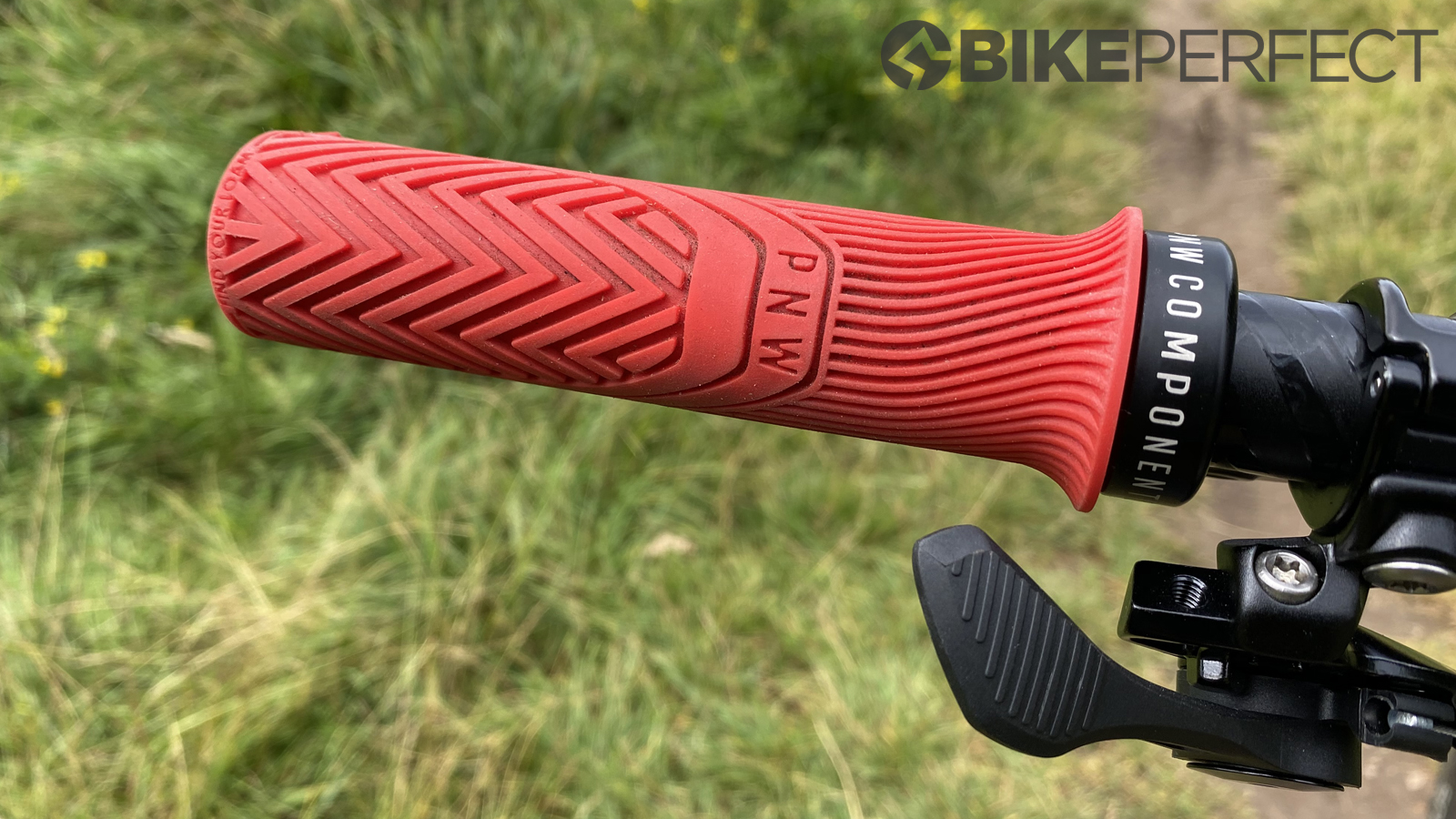
Specifications
Reasons to buy
Reasons to avoid
The PNW Loam MTB grips are made from the brand's ultra soft and tacky compound called 25a Duro 'Happy Camper', which on review Guy Kesteven noted gave him an exceptional grip and stuck to his hands extremely well in all conditions.
The negative around the ultra soft compound was the inevitably splits/tears, that seemed to happen quite easily. However, in general Guy added they wore really well after several months of hard use, and at a great price, they're not a disaster to replace should a tear occur.
Guy also found the tapered sleeves helped tap the Loam's into place easily and securely once locked in, and the ride quality on the grips delivered loads of rich trail feedback with the ribbed tread that features multiple chevrons despite the softness still feeling relatively firm, and offering all the support you need when rallying hard.
Read more of Guy's thoughts on the PNW Loam grips within his wider components review.
7. Best for smaller hands

Specifications
Reasons to buy
Reasons to avoid
The AMS Berm grips have a narrow and tapered profile that is more suited to smaller handed riders. Measuring at just 29.5mm at the lowest point, that grows to 33.9mm on the outside diameter.
On test Graham Cottingham noted that the AMS Berm MTB grips delivered plenty of tactile trail to hand feedback. Graham confirmed the better suitability to smaller handed riders noting that the inside area of the grip felt quite narrow in comparison to his normal go to grips – the very similar ODI Elite Flow.
Other stand-out plus points were the single collar design which has a built-in rubber bar end – that Graham liked as it meant he could lean his bike anywhere without worrying about scratching anything.
Graham marked down the AMS Berm grips as he felt they lacked the tackiness of some other grips for the gloveless rider and they gave little in the way of damping due to their thinner profile. However, if you have small hands, like a tapered shape, and want a very direct bar feel, the AMS Berm grips tick all the boxes.
You can check out Graham's full review on the AMS Berm MTB grips for all the details.
8. Best for bigger hands
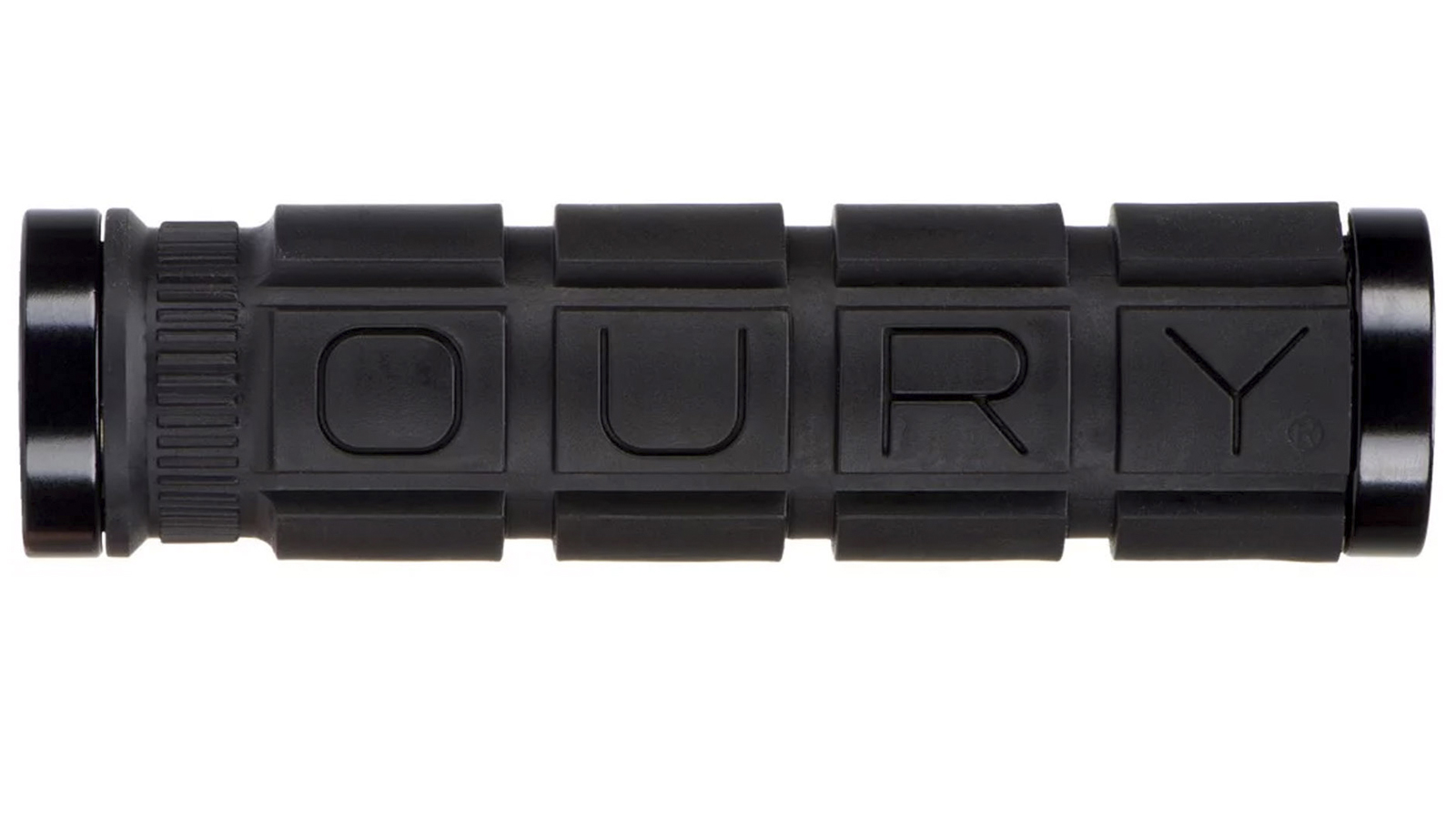
Lizard Skins Oury Lock-on
Specifications
Reasons to buy
Reasons to avoid
Lizard Skins Oury MTB grips feature a simple old-school block design pattern that means the Oury's are easy to grip, and with a 32mm diameter, are super comfortable for the larger-handed rider. The compound is soft, but not too squishy and when combined with the large pad design it also helps eliminate vibration, numbness and slipping with the big, deep and soft rubber lugs also giving exceptional grip comfort.
The simple design gives them an old-school look too, and Lizard Skins offers various customization options, allowing you to choose the bar end style, collar color, and even engrave a message. Better still, the old-school aesthetic suits everything from a rigid single-speed to a long-travel charger.
9. Best lightweight
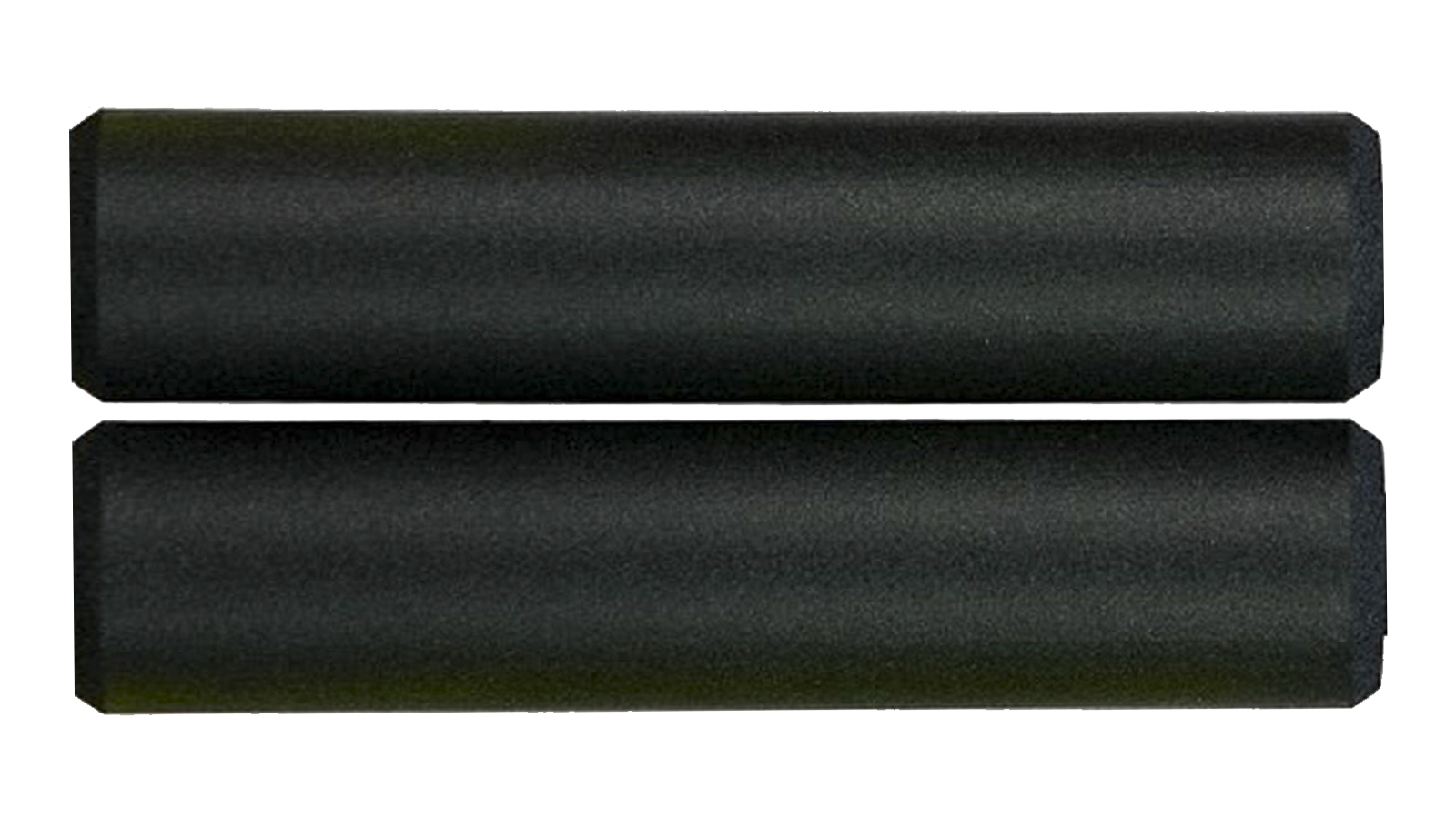
ESI Chunky
Specifications
Reasons to buy
Reasons to avoid
The ESI Chunky MTB grips weigh in at a claimed 60g which makes them some of the lightest MTB grips around. They come from the Arizona-based ESI who were the first brand to make silicone foam grips that have inspired copycat versions from most of the other grip makers.
The ESI is basically a lightweight silicone tube that offers plenty of trail vibration damping, durability, and heaps of purchase even in the worst of riding conditions.
ESI makes the Chunky in a range of shapes and sizes including the Extra Chunky with a wider diameter and an extra 20g of weight compared to the standard Chunky that we tend to prefer. We liked the slightly ovalized form and the 32mm of padding seems to offer the right balance between damping, comfort and bar control in a superbly lightweight package. If shaving the grams is your thing, then the Chunky grips are well worth a look.
10. Best wet weather
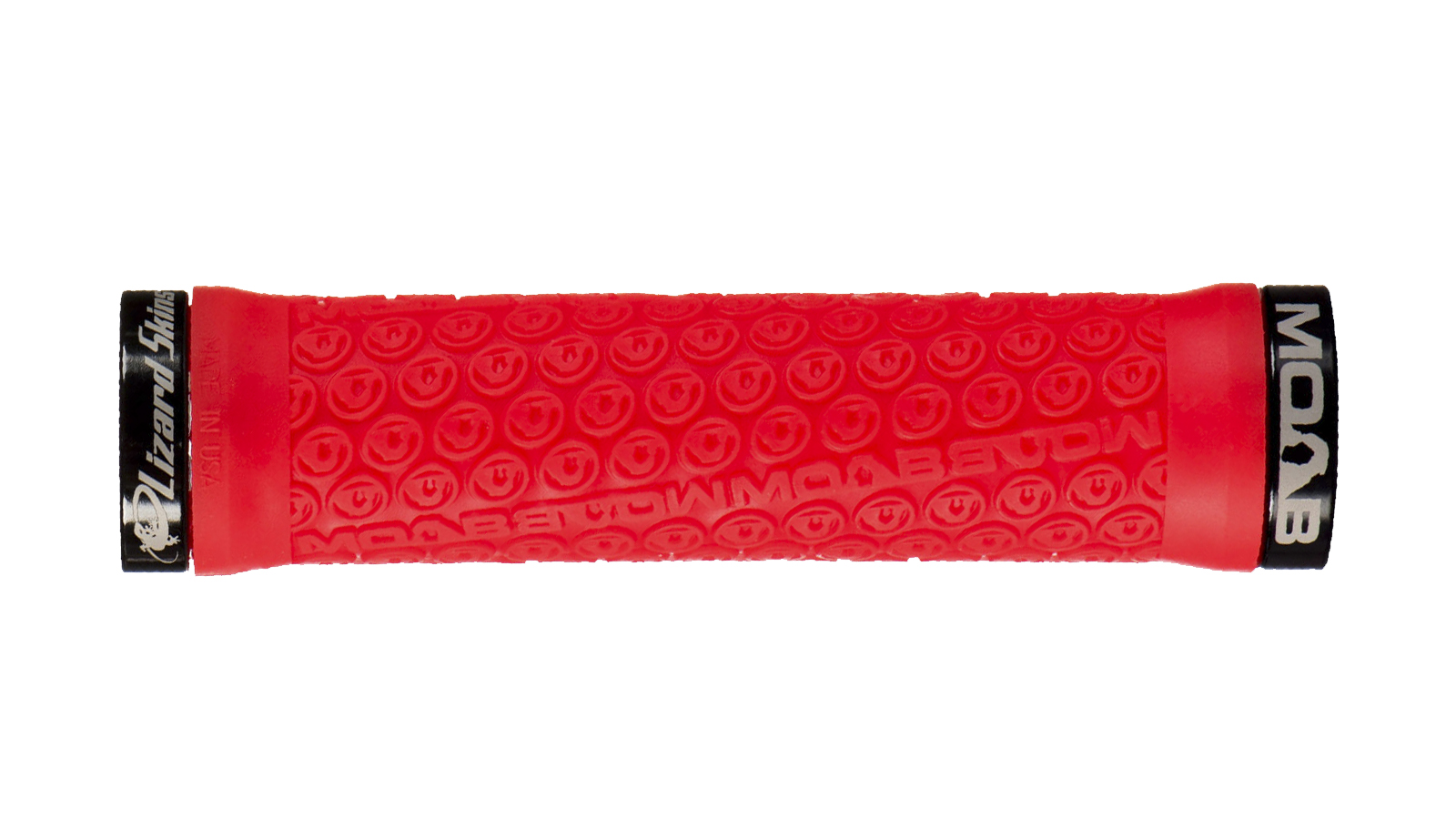
Lizard Skins Moab
Specifications
Reasons to buy
Reasons to avoid
We haven't reviewed the Lizard Skins Moab MTB grip here at Bike Perfect, but our colleagues over at MBR have, and on test, James Smurthwaite was quick to point out the exceptional wet weather performance of the Moabs.
The Moab grip is inspired by the national parks that exist in Moab, Utah, and the design pays homage to the mountain bike heaven that exists in Moab. So for a grip to offer great wet weather performance being named after a town in the Utah deserts is quite surprising, but according to James, that is what they deliver.
The Moab grip has a generous coating of rubber for cushioning with a 31mm diameter, and with lock-rings on either end, they stay firmly in place even with the best efforts to spin them. The only downside is the minimal vibration damping.
So if you're looking for maximum wet conditions grip, then the Lizard Skins Moab could be the MTB grip for you.
11. Best for color range
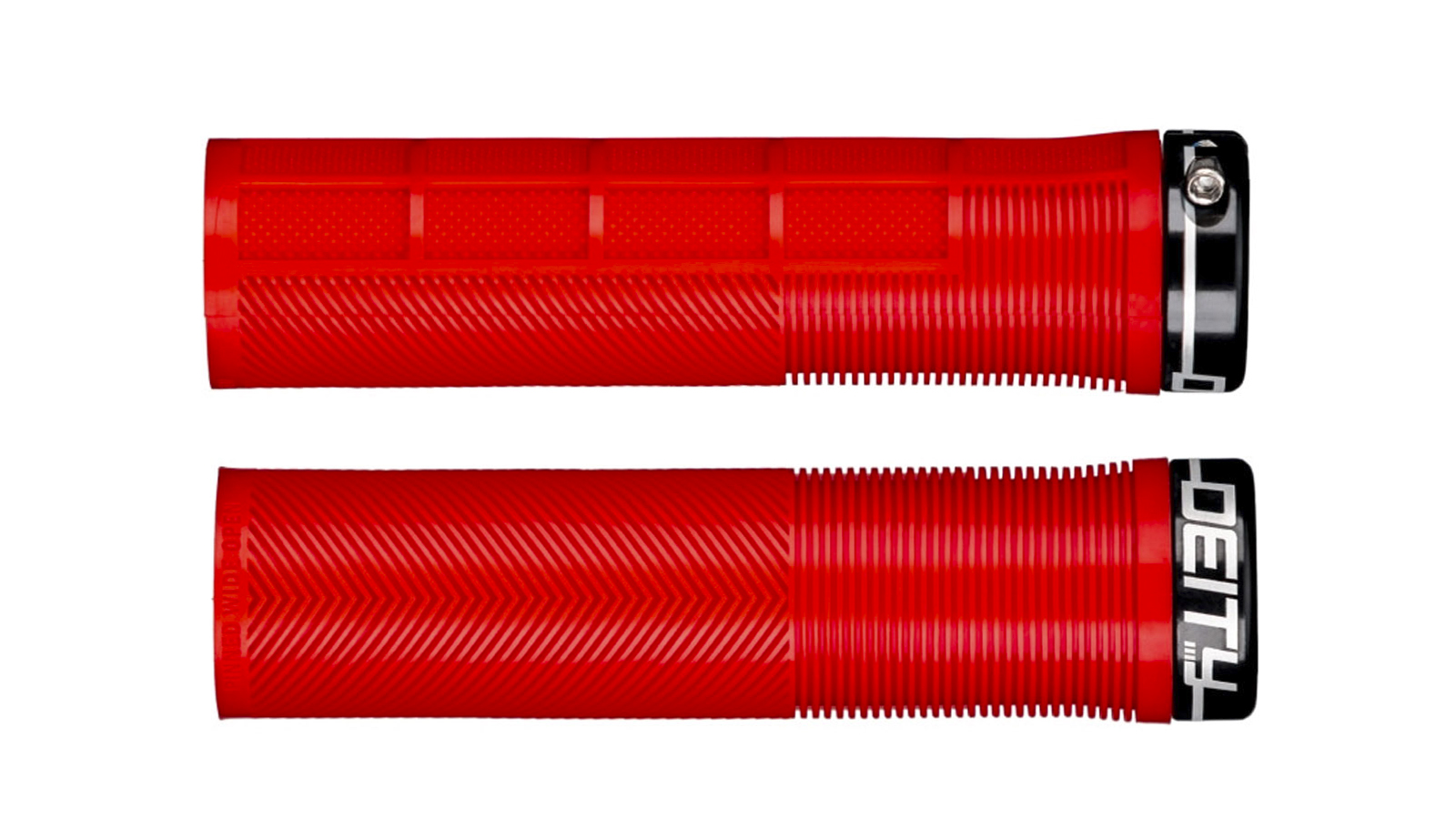
Deity Knuckleduster
Specifications
Reasons to buy
Reasons to avoid
If color coordination details on your mountain bike floats your boat then Deity Knuckledusters MTB grips come in an incredible selection of striking and bright color choices. Color isn't the only selling point though, they are also backed up with superb performance features too.
Made using Deity's TRC rubber compound, which is Kevlar-impregnated, the Knuckledusters offer support and grip for both palm and fingers and blend three patterns in one for enhanced comfort and superior grip.
When reviewed by Mick Kirkman over at MBR, the features he liked included the sensible inner side locking, and the rubber extending right to the bar end with a thicker outer edge that he felt increased the durability. Mick added that although they are slightly thicker than most at 32mm, the grips compressed while riding, feeling cushioned and comfy.
How to choose the best MTB grips
Are all MTB grips the same size?
Grips vary in shape from perfectly round tubes to ovalized cylinders, and some even have supportive wings. Round grips seem to be more responsive, while broad flat surfaces help to spread pressure over a wider surface area and are more comfortable for some.
However regardless of which shape you opt for, there are varying measurements that you'll need to be aware of when buying some new MTB grips.
Diameter
Usually grip width is measured in diameter, and this tells you what size/thickness they'll have, which is useful to know if you have particularly big or small hands. It tends to range between 25-40mm, with most coming in around 30-32. The diameter width indicates the kind of performance you'll get from them as well. For example, thicker grips will provide a more plush, comfortable ride due to the enhanced vibration damping they'll likely provide. However, their larger size will also likely cause a bit more strain on your hands while gripping them, which could cause them to fatigue sooner. Meanwhile more narrow grips won't be so cushy, but they'll offer the best grip and control because they're essentially easier to get your hands around.
Length
As you might have guessed, this is the measurement for how long the MTB grips are, from end to end. They tend to range between 128-140mm in length, with 130-135mm being the average size. This is useful to know if you're swapping out some old grips but really like the current positioning of your brake levers and shifters. Measuring the length of the exposed handlebar (or previous grips) will tell you what you need to look for.
What's wrong with the grips that came with my MTB?
There's nothing wrong with them per se, so there's no reason to immediately swap them out when you get a new bike, unless you know that you want a specific kind of performance. The grips that come with most mountain bikes tend to be quite basic and they'll always wear out eventually. At some point or another, you're going to need to buy some more.
What are lock-on grips?
Lock-on grips have hard plastic with a rubber grip molded around it. As the name suggests, they slide onto your bars with ease and are held in place by clamping lock rings — some only have one, others have two. Because you bolt them on, they offer a high level of security, and it takes a hell of a lot of force to make them slip. However, even with the rubber coating around the inner sleeve, lock-on grips aren't as forgiving as their slip-on cousins.
What are slide-on grips?
Slide-on grips are made entirely of rubber or silicone and usually offer a more plush feel and vibration damping, because they are in direct contact with the bar. To actually get them on your bars, you'll need hairspray, rubbing alcohol or an air compressor — make sure there are no children present when doing it, as there will likely be an expletive or two uttered with gusto.
Why do MTB grips come with different textures?
Some grips are totally smooth such as ESI's silicone grips, while others have deep grooves, some even verging on tread-like, like the Oury Lock-Ons. Channels cut into the grip help to move moisture mud and sweat away from your hands, though riders who regularly wear gloves tend to prefer smaller, less aggressive 'tread patterns'.
Just like tires, the rubber compound plays a role in grip and durability. When brands use words such as 'sticky' or 'ultra tacky' to describe their grips, they will offer good purchase but these compounds tend not to be very hard-wearing.
When will my MTB grips need replacing?
There's no clear-cut answer for this, as it will all depend on how often and how hard you ride your bike. All MTB grips will wear out eventually, and you'll know when yours are nearing their end because the rubber will become so sticky it starts to attract dirt. The grippy texture – or 'tread' – will wear away and become less prominent, and in some cases the grips might even tear.
It's not just about wear and tear though; if you're experiencing discomfort in your hands while you ride, whether it's sore spots, hot spots, numbness or tingling, or you're developing blisters or calluses, then you should try a new pair.
If I have MTB grips, do I also need MTB gloves?
While the answer to this is technically no, if you're riding on trails, or any kind of terrain that's challenging, it's always sensible to wear a pair of the best mountain bike gloves. Not only will they protect the skin on your palms in the event of a crash, but gloves will improve your grip when things get damp or sweaty. Many of them are armored specifically to pad the most vulnerable parts of your hands, so it's a very good idea to wear a pair.
How we test the best MTB grips
We ensure to run the grips we're testing for as long as possible (at least several months) in a range of riding conditions to see how they perform in different weather/temperature/trail scenarios. We've also run many of the best grips here to total destruction in long term tests and our own personal bikes.
Meet the testers
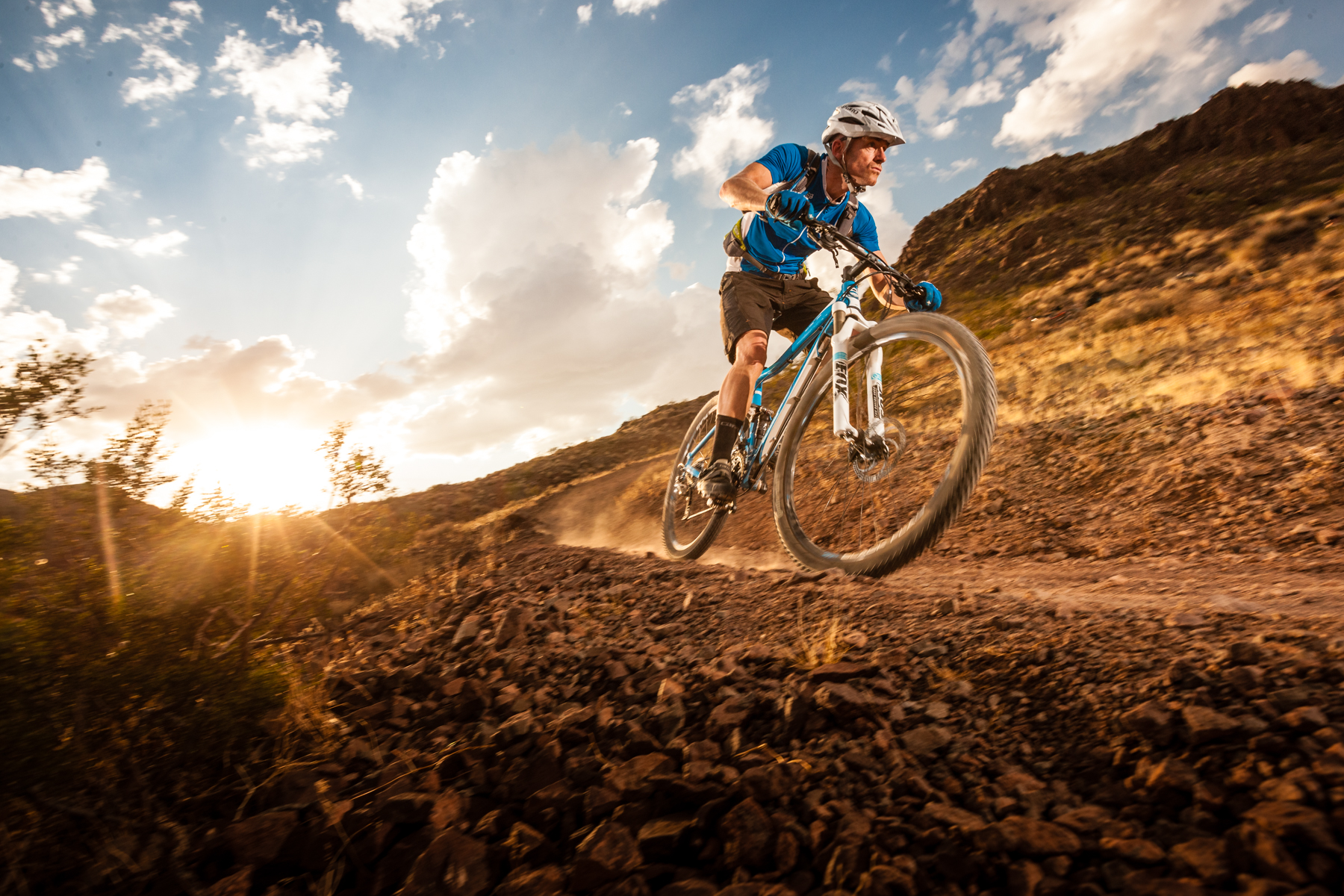
Hatched in Yorkshire Guy's been writing and testing for bike mags since 1996. He's written several million words about several thousand test bikes and a ridiculous amount of riding apparel, tech and kit.
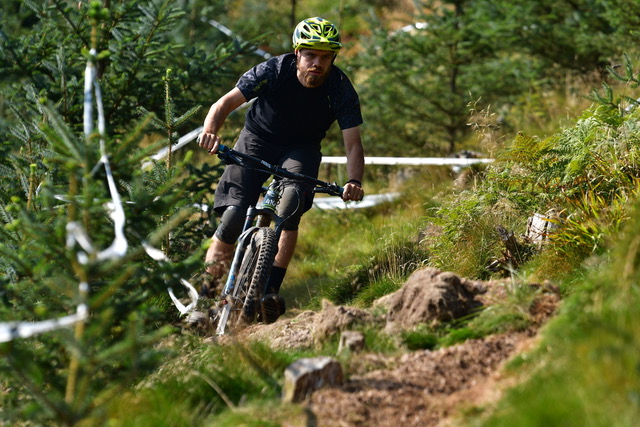
Graham is all about riding bikes off-road. Based in Edinburgh he has almost 20 years of riding experience, and has dabbled in downhill, enduro, and gravel racing.

Neal has worked in the bicycle industry his entire working life and he has an in-depth knowledge and love of all things cycling. Based in Sheffield, UK, he can be found riding his local trails on a wide variety of bikes whenever he can.
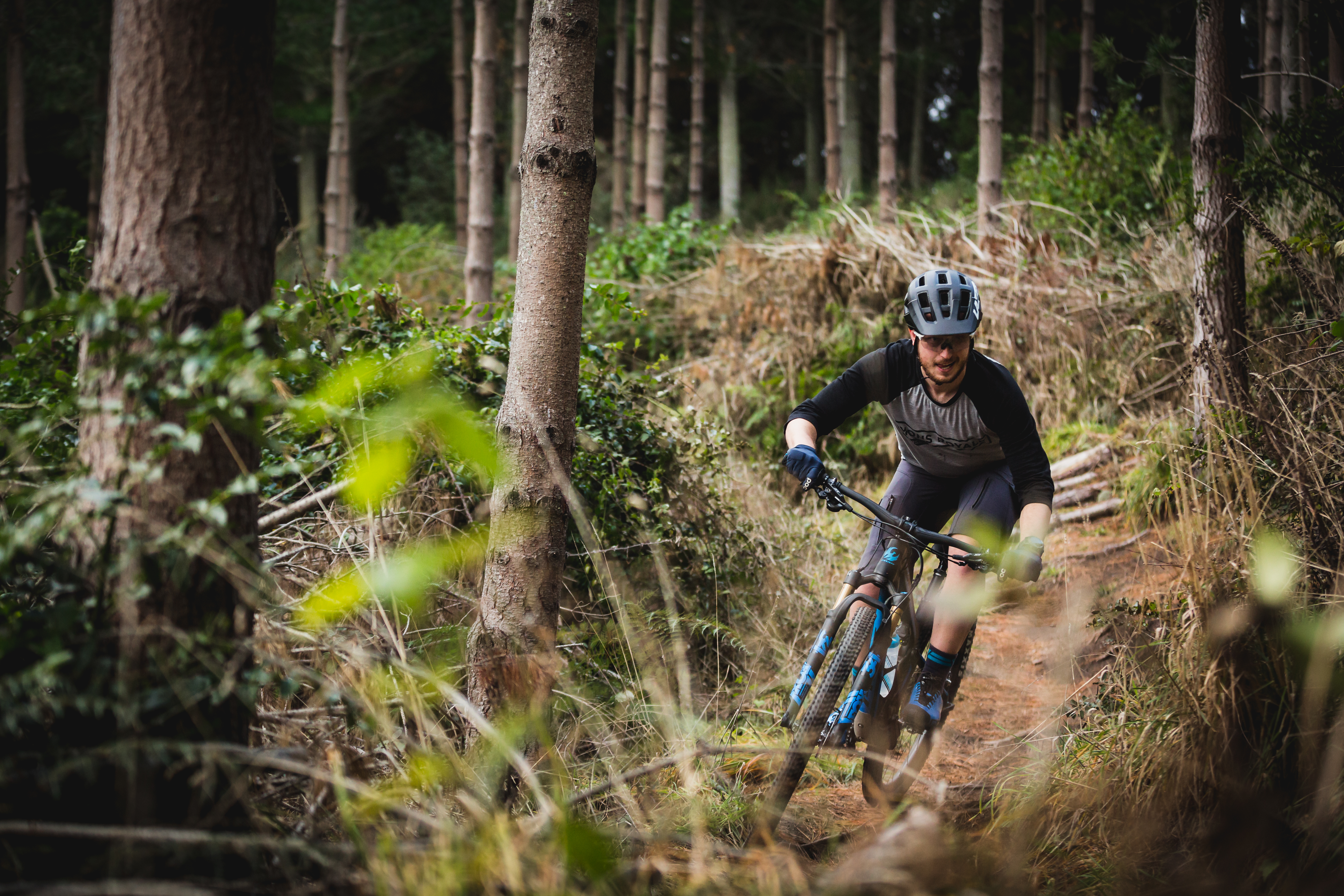
Colin came from a ski racing background before joining the Colorado State University cycling team, and he hasn't stopped riding since. You'll likely find him in search of flowy singletrack, gravel roads and hairpin corners.

Rich Owen joined the BikePerfect team as editor in 2021. He's worked as a journalist and editor for over 24 years, with 12 years specializing in cycling media. Rich bought his first mountain bike (a rigid Scott Tampico) in 1995 and has been riding MTB for almost 30 years.
Current rides: Merida One-Forty 6000, Banshee Paradox, YT Jeffsy Core 3, Saracen Ariel 30 Pro
Height: 175cm
Weight: 69kg
- Guy KestevenTechnical-Editor-at-Large
- Colin LevitchFreelance writer
- Neal HuntFreelance Writer
